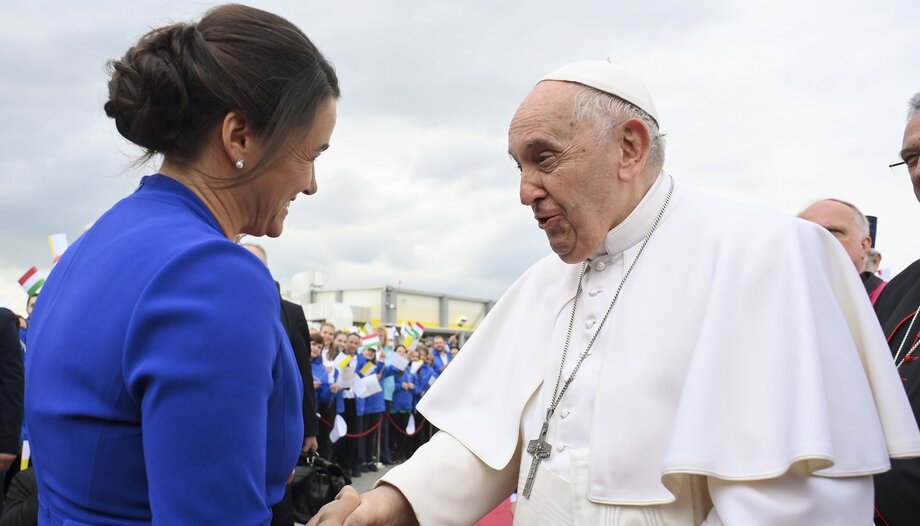In the days leading up to the trip, the subject of the Holy Father's visit to Hungary had already sparked controversy due to the different interpretations of his statements, but this became even more pronounced after his departure.
Different interpretations
While Viktor Orbán's right-wing nationalist government was happy to claim the pastoral trip as a confirmation of the Pope's commitment to the traditional social values of the European Union, commentators critical of the government tended to highlight the Holy Father's statements less in line with official government policy.
"They want to make the apostolic journey a political event, to show the Vatican and the world how Christian our nation is. But in the meantime they exclude others because - as they argue - the Pope comes exclusively 'to them' and not to others," complained a commentator in the daily newspaper Népszavacritical of the government.
For its part, the semi-official newspaper Magyar NemzetThe Hungarian journalist, close to the government, focused on the struggle of "Christian Hungary" against the "faithless West": "Although it seems that we are gradually becoming a curiosity in Europe because of our Christian faith, we stand firm. For us, the fundamental law starts from God, even if we have had and have to hear a lot from the cultured West because of our 'reactionary attitude'. (...) We faithful Hungarians carry the cross of Christ. We do it with joy, because to believe is to act according to our heart, to remain faithful in good days and in bad, in peace and in bloodshed."
Budapest: the city of bridges
However, the Holy Father himself did not take one side or the other, but stressed in many ways the importance of "building bridges" during his visit.
Budapest is "the city of bridges, of saints and of history," he said in his first speech Friday at the Hungarian government headquarters, a former Carmelite monastery. In subsequent speeches, the pope also reached out to the poor and marginalized, such as meeting with the needy, homeless and refugees at St. Elizabeth's Church. "The poor and the needy are at the heart of the Gospel," he recalled at the place of worship dedicated to St. Elizabeth of Hungary, great helper of the poor.
In this context, commentators critical of the government pointed out that Hungary had only significantly relaxed the rules for social institutions last year, as a result of which these institutions now have to meet less stringent requirements than before to serve the poor and homeless.
On Saturday morning, the Holy Father visited an institution for the blind and disabled. The home for the blind Blessed László Batthyány-Strattmann Institute in Budapest was founded by the nun and social worker Anna Fehér (1947-2021) during the communist era and is currently managed by the Kolping Association. The residence is named after the ophthalmologist and father of the family László Batthyány-Strattmann (1870-1931), beatified by Pope John Paul II in 2003. This aristocrat devoted himself entirely to the poor, founded hospitals and self-sacrificingly cared for his poorest patients. In March 2023, the process for the beatification of his wife, Maria Theresia Coreth, who was Batthyány-Strattmann's closest collaborator and confidant, will begin.
Personal impression of the visit
During his three-day pastoral visit, Francis fulfilled the usual appointments on these occasions, such as meetings with representatives of the State, the local Church and young Christians, but he also brought his personal touch.
For example, outside the official program, he received the Russian Orthodox bishop in Hungary, Hilarion (Alfeyev). Metropolitan Hilarion had been one of the most influential figures in the Moscow Patriarchate as head of the foreign office since 2009. But, a few months after Russia's attack on Ukraine in 2022, he was deposed by Patriarch Cyril for unknown reasons and appointed bishop of the tiny Russian Orthodox community in Hungary. Pope Francis told reporters on his return trip from Budapest about his talks with Hilarion that "they had not only talked about Little Red Riding Hood," but also, for example, about the question of peace in Ukraine.
Also not on the official program was a private meeting of the Pope with the mayor of Budapest, Gergely Karácsony. This politician opposed to the government has been in office since 2019, and repeatedly complains about the lack of government financial support for the capital.
However, Karácsony told the media that the conversation with the Holy Father "did not deal with the issues of everyday politics." Rather, he said, they talked about how politics can be based not on division, but on the unification of opposites. Karácsony presented the Holy Father with an old photograph of Budapest's Chain Bridge, again bringing the theme of "bridge building" to the forefront.
Second visit to Hungary
This was Pope Francis' second visit to the Hungarian capital. This has led some Hungarian bishops to claim that, with the exception of Italy, Hungary is the only country that the Holy Father has visited more than once. In reality, however, he had already been to Greece and Cuba twice during his pontificate.
Whereas in September 2021 Francis spent only a few hours in Budapest for the World Eucharistic Congress and then traveled directly to Slovakia - a fact that some commentators interpreted as a criticism of the Hungarian leadership - he has now taken three days to meet with the people and visit various institutions.









